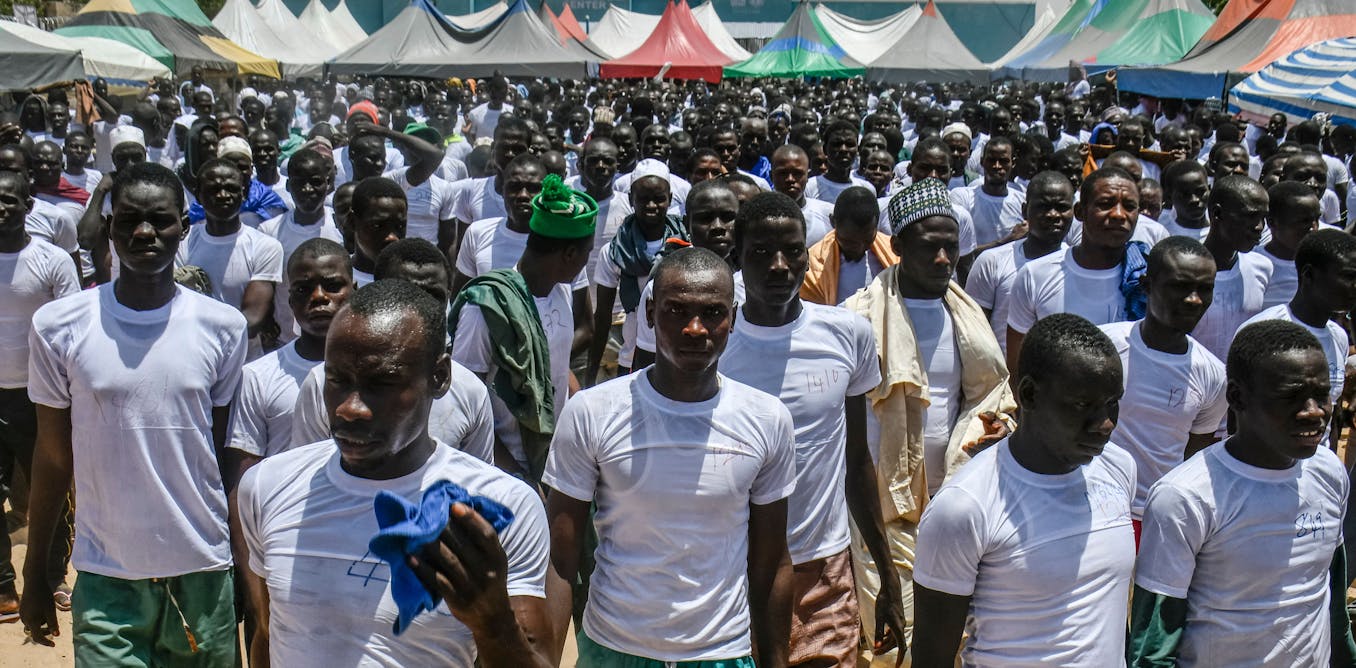
The world has come to associate the insurgency in north-east Nigeria with the slogan “western education is forbidden”. This is how “Boko Haram” – the name given to the insurgents – is commonly translated from the Hausa language into English.
But “Boko Haram” is not what the insurgents call themselves or would like to be called. Different factions operate under different names. None of them use “Boko Haram”.
One faction calls itself Jama’at Ahl al-Sunna li-Da’wa wa-l-Jihad or “People Committed to the Propagation of the Prophet’s Teachings and Jihad”. Another faction uses the name Wilayat Garb Ifriqiya or Islamic State West Africa Province.
The preachings of the late insurgency leader Mohammed Yusuf (1970-2009) against western education earned his movement the nickname Boko Haram, which gained traction from 2009 onwards.
High-profile attacks on western schools, including the abduction of 276 schoolgirls from Chibok in April 2014, fed perceptions of the insurgency as opposing western education.
Western education was introduced in north-east Nigeria under British colonial rule, displacing the Islamic education system that produced the elite in pre-colonial times. Today, most formal sector jobs and government positions in Nigeria require western education.
Because of the destruction, bloodshed and mass displacement that the insurgency has caused in Nigeria, we wanted to know more about the role education plays as a grievance and as a way to build peace.
Our research aimed to explore what motivated ordinary members of the insurgency group, popularly called Boko Haram, to fight. Was opposition to western education a reason? We also wanted to know how being part of the insurgency had influenced their views on this education system.
By speaking to the rank and file, we sought to go beyond the rhetoric of the insurgency leadership.
Most of the respondents said that hatred of western education was not what motivated them to join the insurgency. They had other reasons. And their experiences as insurgents reinforced the value of a western education.
We argue that these results show how important it is to make western education accessible to all who want it.
Views on western education
We conducted 13 in-depth interviews and five group conversations with former insurgents in Bama and Maiduguri, Borno State, in 2021 and 2024. This was part of a larger research project on education and violent conflict in north-east Nigeria.
Our conversations focused on former members’ reasons for joining, their experiences of education inside the insurgency, and their perspectives on education after leaving. The majority of respondents were Kanuri men in their twenties and thirties with mostly Qur’anic education.
Some acknowledged that Yusuf’s preaching had resonated with them at the time of their recruitment. But they didn’t join out of hatred of western education.
Instead, they discussed other reasons for joining:
- material incentives
- perceptions of the insurgents as doing “God’s work” (aikin Allah)
- the pull of family members and peers
- fear of retaliation.
Most of our respondents did not object to western education. To the contrary, they considered it desirable. Many had enrolled themselves or their children in western schools.
Not everyone agreed to everything happening within western schools. Some respondents expressed reservations against co-education and some curriculum contents, especially in biology and geography, such as evolution, the rain cycle, and earth’s rotation around the sun.
Overall, the views were positive. The respondents considered western education important to find employment, to handle everyday life situations and to achieve societal progress, for example regarding healthcare.
To understand why former members view western education in such a positive light, it is helpful to take a closer look at their experiences inside the insurgency.
Ideology vs tactical needs
Despite what leaders of Boko Haram said about ideology, our research respondents found that they valued western knowledge for the tactical advantages it offered.
It was the western-educated who operated the laptops, repaired the phones and the cars, shot and shared the video footage, dispensed the medicines and treated the wounded.
The members we spoke to said they saw what a difference western education made. Those with only limited Qur’anic education or no education at all occupied lower ranks within the insurgency. They were more likely to be sent into combat, at great risk of being wounded or killed.
Respondents concluded that the insurgency leaders’ proclaimed views on western education could not be trusted.
What they could trust was what they saw with their own eyes. For instance, some western-educated defectors got recruited to work for the NGOs responding to the humanitarian crisis in north-east Nigeria.
Some of their western-educated peers who had not joined the insurgency had found decently paid employment with the police or army, or as teachers.
Most argued that being well educated could protect people against indoctrination and manipulation. This included having western education. One respondent said:
They came and misled us [in the area of] Islamic [studies]; maybe next time they will use western education to mislead us. If I have knowledge, no one can do that.
They were not blind to the shortcomings of the western education system as it currently operates in north-east Nigeria, though. They were aware of how difficult it can be to get education and work without financial backing or the right connections.
As one respondent put it:
You cannot seek for knowledge without a penny in your hands.
What next?
On the basis of our findings, we recommend that policy makers:
- ensure western education is genuinely free and accessible – including exams, uniforms and books
- make sure that skills can be translated into meaningful job opportunities
- facilitate exchange between people of different educational backgrounds.

Hannah Hoechner, Associate Profesor in Education and Global Development, University of East Anglia and Yagana Bukar, Professor of Geography, Faculty of Social Sciences and the Centre for Disaster Risk Management and Development Studies, University of Maiduguri, University of Maiduguri
This article is republished from The Conversation under a Creative Commons license.

